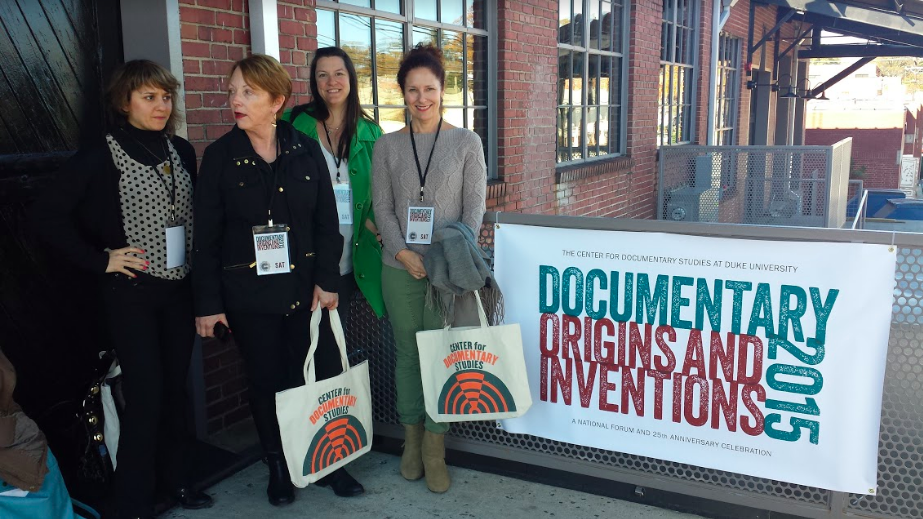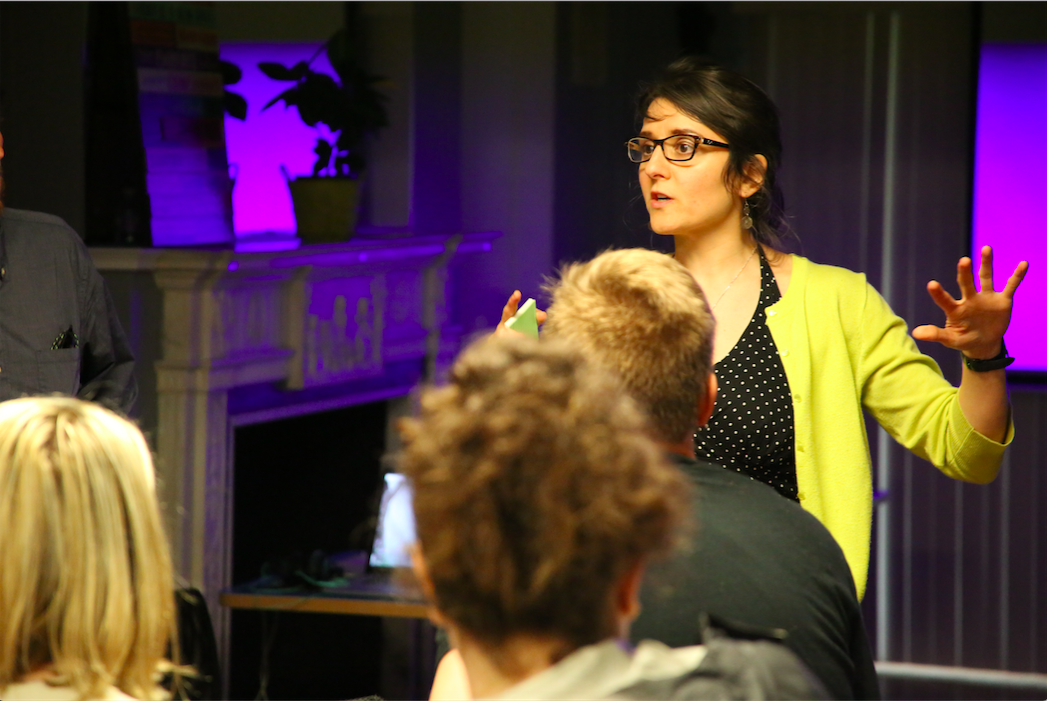Since the Spring of 2016, Muhlenberg students have had the opportunity to minor in Documentary Storymaking a unique program shared with Lehigh University and Lafayette College. Described as a “multicampus, multidisciplinary program that provides students an opportunity to integrate documentary making into their undergraduate studies,” this minor is an exciting and unusual opportunity that utilizes the Lehigh Valley Association of Independent Colleges (LVAIC) to forge new connections and experiences across the Lehigh Valley.
Media and Communication professor Dr. Lora Taub-Pervizpour is the director of the Documentary Storymaking Minor and has witnessed the program’s growth from its inception.
“The Documentary Storymaking minor program grew out of conversations that began in 2013, among faculty and staff at Lehigh, Muhlenberg and Lafayette. In Spring 2013, we received our first LVAIC grant to support a “digital storytelling working group.” Our aim was to explore the different practices, methods, courses and communities exploring digital storytelling across our campuses. We were especially interested, from the outset, in the ways digital storytelling practices were connecting campus and community partners in efforts directed towards shining a light on and amplifying local stories and voices not often (or ever) included in commercial media,” explains Taub-Pervizpour.
After grants from the LVAIC were given to help support the growth of this digital, cross-campus program, the final idea for the Documentary Storymaking minor emerged, and “was submitted to the curriculum committees on all three collaborating campuses, and ultimately approved–unanimously–by the faculty at each campus,” says Taub-Pervizpour.
She explains that the minor itself grew “organically” from this storytelling perspective, and describes how the concepts of documentary storytelling itself are closely linked to the principals of a liberal arts education.
“While there are few documentary programs in liberal arts colleges, we believe it is ideally situated in a liberal arts environment. With an emphasis on close observation, deep listening, ethical meaning making and attention to the often underreported or untold stories within a community, documentary study and practice lends itself well to the goals and mission of liberal arts teaching and learning,” says Taub-Pervizpour.
“With an emphasis on close observation, deep listening, ethical meaning making and attention to the often underreported or untold stories within a community, documentary study and practice lends itself well to the goals and mission of liberal arts teaching and learning,”
The unique focus of this minor has attracted students from diverse majors to the program. Laura Pezzulich ’19, a philosophy major, explains how she discovered and pursued this program.
“I am a philosophy major, but I’ve always been interested in documentary work and I’ve always had a creative side that I felt I was neglecting while in school. When I stumbled upon the Documentary Storymaking minor on the Media and Communication webpage and I read more about it, I knew I had to pursue it. It was the most difficult thing I’ve ever done in my college career (I’ve been a college student since 2010), but it was real–a treasure hard to come by in the safety of academia,” says Pezzulich.
She also describes the opportunity she experienced attending the Full Frame Documentary Film Festival in Durham, NC with her class.

“It allowed us to picture ourselves as true filmmakers and apply what we have learned when viewing and discussing the work of professional documentarians,” says Pezzulich.
This experience is shared by Media and Communication student, Ali Ruchman, ‘19, who has recently declared a minor in Documentary Storymaking.
“I’ve really enjoyed the minor so far. I really like taking classes with people from other schools because it’s really interesting to get perspectives from different types of people, especially since many people in my Intro Doc class aren’t film or media and communication majors. I’ve also really enjoyed working with people in the Allentown community on our projects and I look forward to doing more of that in my classes next semester!” says Ruchman.
The minor shares some similarities with the Documentary Research course that is required for the Media and Communication major and is an elective for the Documentary Storymaking minor. Dr. Kate Ranieri, assistant professor of Media & Communication, has been involved with the planning of the Documentary Storymaking minor since the beginning and explains how the Documentary Research class, which she regularly teaches, has “lead to explorations of or engagement with the minor.”
“One of our first graduates attributed their inspiration to do Storymaking to their initial work in Documentary Research. They were in Doc Research when we were studying campus life in the forties. Drawing on their initial fascination with the numerous 1940’s cigarette advertisements in the Muhlenberg Weekly, they eventually created a story about the smoking culture of campus during WWII including smoking events called smokers,” says Ranieri.
With four students having graduated with the minor to date (three at Muhlenberg and one at Lehigh), and four to graduate with it this May, Dr. Taub-Pervizpour explains that with the organization of a multicampus program come the hurdles of “the logistics of scheduling [and] transportation” between schools. Ultimately however, the work of the students involved outweighs any technical challenges encountered along the way.
“When you look at the student work, when you listen to their critical inquiries and compassionate engagement with community members and collaborators, when you glimpse in that shared documentary making experience the possibility of new kinds of connection–that’s the real triumph,” says Taub-Pervizpour. “As director of the program, I spend a lot of time thinking about how to lower the barriers for students to participate in the minor–barriers like distance and time. But the work students and faculty are doing, in community, that’s where the real boundary breaking is happening, where documentary practices and partnerships are enabling long standing barriers of understanding, listening and seeing, to fall away.”
“The work students and faculty are doing, in community, that’s where the real boundary breaking is happening,”
In order to complete the minor, students must complete three sequential courses: Introduction to Documentary Storymaking, Legal and Ethical Questions in Documentary Practice and Capstone in Documentary Storymaking as well as two electives which can be taken at any of the three participating colleges but vary each semester. With some of these courses being production focused, Pezzulich recounts her initial difficulties with the minor without having the production background of some Media & Communication majors. However, she explains how she overcame these challenges to shape her experience and even make meaningful connections with her own philosophy major.
“I will say that not having production courses before going full force into a production heavy minor was tough, so if you are not a Film Studies or Media and Communications major, the key is to be receptive to your team of students and professors championing you on to make something you are passionate about,” says Pezzulich. “One important insight I had was how my philosophy background certainly informed the theory behind documentary narrative and ethics, and as I moved through the minor I noticed how documentary film theory equally began to inform my philosophical perspective.”
Even in the first few years of this expanding program, both teachers and students involved in the minor’s growth express their praise for the progress and material created thus far. Professor Taub-Pervizpour expresses her gratitude for the collaborative additions of all the professors involved.
“Through the work of its founding faculty and staff, including Jenna Azar, Aggie Ebrahimi Bazaz and Kate Ranieri at Muhlenberg, Andy Smith and Nandini Sikand (Lafayette), Julia Maserjian, Jack Lule, Greg Reihman, Tamara Myers, and John Pettegrew (Lehigh), the minor has continued to evolve during its first three years. Our sense of the possibilities for documentary storymaking in the Lehigh Valley has deepened, as have our experiences pursuing a documentary pedagogy that is rooted in, responsive to, and caringly shaped in dialogue with community collaborators,” she says.

Laura Pezzulich reflects on the benefits of the program’s multi-campus nature and how the diversity of the collaborative colleges themselves supported her own growth and learning.
“I felt fortunate to be able to work with professors and students from Lehigh and Lafayette. The campuses are all so different which was great because you learn that you have technical and emotional resources through professors and students all over. I became more thoughtful, more aware of important issues, more compassionate, more inquisitive, more positively skeptical, and more connected to Muhlenberg because of this minor,” she says.
The minor’s description explains that “the study of documentary histories, theories, and practices is a way for students with diverse academic interests to develop digital literacies that complement the research and writing skills they are developing in their majors.”
This interdisciplinary focus as well as the program’s reach across multiple campuses displays the unique and immeasurable benefits of this minor’s application. The community based core of the Documentary Storymaking minor poses exciting opportunities for the telling of unheard stories in the Lehigh Valley at large, but also in Allentown and at Muhlenberg specifically. As Laura Pezzulich describes it:
“This minor truly embodies the apex at which one can experience a liberal arts education.”
Laura is a sophomore Media and Communication student in the Pre Law program. In addition to being News Editor at the Weekly, she is a DJ at Muhlenberg's radio station WMUH.






















